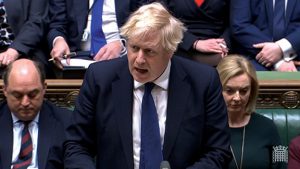Bloomberg
From Chelsea penthouses to Highgate mansions, Russia’s long-standing infatuation with UK real estate is evident from a cursory glance at some of the country’s priciest property transactions. The past decade has seen that trend explode.
The number of UK properties whose owners’ principal correspondence address is in Russia reached 1,127 in August 2021, according to data released by the Land Registry under Freedom of Information laws last year. That’s up from 86 at the start of 2010 — a 1,200% increase.
And that’s likely a lowball figure. It doesn’t capture properties that are owned by companies — a structure often favored by wealthy owners from around the world looking to camouflage their holdings.
The Ukraine conflict could finally thrust such anonymous owners into the open. Prime Minister Boris Johnson said he would push forward legislation on a long-stymied register of overseas property ownership as the UK sanctioned more than 100 Russian individuals and entities, part of a coordinated push by Western countries against Russian companies and oligarchs in the wake of that nation’s invasion of Ukraine.
The UK measures, which target everything from banks to Russia’s national air carrier, also include a new unit in the National Crime Agency to target “Russian assets hidden in the UK,†Johnson said. It will mean “oligarchs in London have nowhere to hide.â€
A spokesperson for the NCA said the agency “will use all legislative options and tactics available to the agency to pursue the assets of corrupt elites.â€
A registry would be a marked shift for the UK’s often opaque real estate market where offshore entities can shield the identities of owners.
More than 85,000 properties are owned by offshore entities, according to Transparency International, a nonprofit organization. That’s despite a series of tax measures introduced since 2013 that punish owners that hold properties via companies rather than in their own names.
Transparency International estimates that about 1.5 billion pounds ($2 billion) worth of UK property has been bought by Russians accused of corruption or with links to the Kremlin since 2016. About 55% of that is held by companies in Britain’s Overseas Territories and Crown Dependencies.
Even the truncated Land Registry data show property is a key asset class for Russians. The relative growth in the number of buildings whose owners appear to live in Russia was among the fastest of any country. Only UK properties whose correspondence addresses were listed in Taiwan and mainland China increased at a quicker pace.
“London is a truly international city that attracts truly international people from all over the world,†property advisor Charles McDowell said in a phone interview, noting he’d seen an uptick of Russian buyers in the past year. “As with any country, you’re going to get your fair share of good, bad and indifferent.â€
Other areas have also appealed to Russians. Scottish estates have proved popular, so too the manicured lawns, golf course and round-the-clock security offered by St. George’s Hill, a 960-acre (388-hectare) gated enclave in Surrey.
 The Gulf Time Newspaper One of the finest business newspapers in the UAE brought to you by our professional writers and editors.
The Gulf Time Newspaper One of the finest business newspapers in the UAE brought to you by our professional writers and editors.
